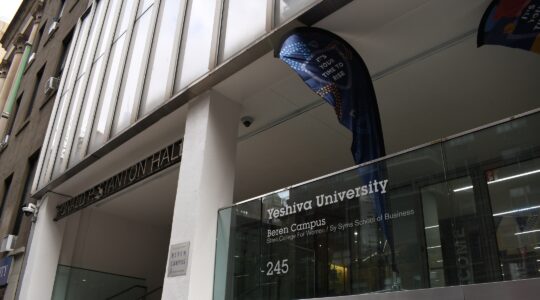(JTA) — In a declaration issued Thursday and stressing the danger of “the open internet without any filter,” more than a dozen rabbis from the Skver Hasidic movement prohibited the use of artificial intelligence, specifically citing the technology firm OpenAI.
The blanket ban on artificial intelligence is the latest instance of haredi Orthodox authorities forbidding or restricting their followers from using cutting-edge digital technology. For years, haredi rabbis have warned their communities of the moral dangers associated with internet usage, and some have instructed their followers to place filters on their phones and other devices that prevent users from accessing a wide range of the internet.
Now, the Skver community’s rabbis are taking a similar approach to OpenAI’s ChatGPT and other tools in the rapidly growing universe of AI chatbots and image generators. It is an especially sharp manifestation of the broader concern over the range of risks posed by the increasing capabilities of artificial intelligence and its potential to reshape society.
The signatories of the Hebrew-language letter wrote that AI is “open to all abominations, heresy, and infidelity without limits.” It citied Biblical texts and rulings from previous rabbis as supports for the prohibition.
“It is possible that at this point, not everyone knows the magnitude and scope of the danger, but it has become clear to us in our souls that this thing will be a trap for all of us, young and old,” the letter said. “Therefore, the use of ‘AI’ is strictly prohibited in any shape and form, even by phone.”
The Skver community is based in the village of New Square, New York, and is considered particularly traditionalist. Other Orthodox groups, particularly the Chabad-Lubavitch Hasidic movement, have embraced technology.
Many members of the Hasidic communities who do use the internet are expected to do so with so-called “kosher” filters that block content considered inappropriate, such as pornography, gambling sites or, in certain instances, a much broader range of content that could lead users away from their strict religious observance.
Last June, two massive rallies geared toward Hasidic women urged them to delete their social media profiles and give up their smartphones — and to access the internet through a filter only when totally necessary. Those rallies, which drew criticism for limiting women’s financial opportunities and access to information, came a decade after approximately 40,000 mostly haredi men attended a similar rally at Citi Field warning of the dangers of unfettered internet access.
JTA has documented Jewish history in real-time for over a century. Keep our journalism strong by joining us in supporting independent, award-winning reporting.






